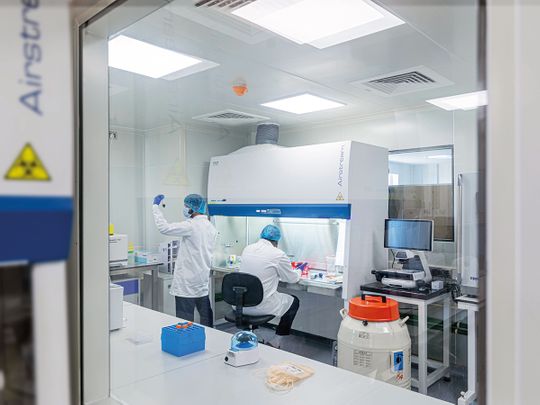
India is home to one-fifth of the world’s population and the health status of its citizens is demographically dispersed, with cancer accounting for the large part of non-communicable disease-related mortality as per national estimates. Increased longevity in India from the 40s, at the time of independence to mid-60s as of now marks the nation’s progress in health, but also highlights an increased risk of non-communicable diseases, especially cancer. In Indian women, cervical cancer takes a life every 8 minutes.
Up to 50 per cent of newly diagnosed breast cancer patients will die in five years, and tobacco use is responsible for 3,500 deaths each day. Statistics such as these present a significant socio-economic burden for the nation.
Reports indicate that India lost $6.7 billion, accounting for 0.37 per cent of GDP, in productivity due to cancer. It therefore becomes a critical priority for the government to focus on establishing a comprehensive cancer care ecosystem. Access to multiple lines of therapy including recent innovations remains a challenge in India, and indeed, the 60 per cent of cancer patients on the planet living outside the developed world.
Increased prediction accuracy
Leapfrogged development in cancer diagnosis and therapeutics has revolutionised real-world application of precision medicine, more so in the western world. AI-driven smart protocols enable earlier diagnosis, improving clinical response owing to prompt initiation of therapy. Recently, an AI system2 integrated with endoscopic ultrasonography (EUS) could distinguish between benign and malignant tumours of the gut and increase prediction accuracy from 15 per cent to nearly 90 per cent. These initiatives allow faster clinical decision making, with standardised reporting and increased efficiency.
Likewise, integration of next-generation sequencing (NGS) techniques in clinical oncology practice in major academic centres in the West has led to successful and planned use of targeted therapies. A recent study demonstrated that identification of circulating tumour DNA (ctDNA) through NGS techniques could determine a treatment paradigm that benefited patients with stage II colorectal cancer. However, similar translation to routine clinical screening in Indian hospitals remains a work in progress.
Advancements in cancer treatment such as application of robotic surgeries have refined minimally invasive techniques for tumour removal while reforming scope for focal radiation therapy. Cancer patients with leptomeningeal metastases, a difficult-to-treat cancer owing to its location and spread, had a significant benefit in relapse-free survival (> 3-fold) and overall survival (>2-fold) with focal craniospinal radiation therapy using protons compared to standard treatments.
Adoption of developments for cancer care are driven not just towards improving cure rates and survival in early disease, but also in palliation towards improved overall quality of life for patients through less pain, reduced anaemia, shorter hospital stays, and shorter recovery times post-discharge. Of course, new biotechnology and pharmaceutical products continue to grab headlines for cancer care.
In the news
However, the biggest breakthrough in cancer therapy, and in focus at global oncology meetings such as ASCO, ASH, EBMT EHA recently has been the global approval and application of autologous chimeric antigen receptor T-cell (CAR-T) therapies for treatment of blood cancers. Auto-CAR-T cell therapy involves harvesting a patient’s own immune cells, which are then genetically altered in a lab to express certain binding receptors before being reinfused back to the patient. These Chimeric T cells then bind tumour cells and kill them.
CAR T-cell therapy for leukaemia has the potential to reduce three years of conventional treatment (using oral drugs, chemotherapy, bone marrow transplant, etc) to just three weeks with long-lasting clinical response. Children treated with cell therapy for instance, have been cancer-free for 10 years or more, signalling a truly momentous moment in the battle against cancer.
Considerable work is being carried out to extend potential of cell-based therapies to other cancers (solid tumours such as lung cancer, pancreatic cancer, liver cancer, etc.), but data from ongoing clinical trials have yet to exhibit efficacy seen with CAR-T cell therapies in blood cancer and thus, remains a subject matter of further research. Nonetheless, immune effector cell-based therapies will grow into a pillar of care, like chemo, radiation and surgery offering much better long-term outcomes.
The US market has six approved CAR-T products marketed by Novartis, Gilead & Bristol Myers Squibb, all of whom have operations in India. Yet, none have accessed the Indian market despite large unmet need, considering the challenges associated with out-of-pocket expenditure and the price-sensitive nature of the target population. The potential of curing the disease within a short duration and personalised nature of therapy has revolutionised standard of care regimens in the approved markets, with a growing desire to use CAR-T cell therapies in earlier lines of care. However, the clinical promise of these approved therapies is limited by their incredibly high cost (more than $450,000 in the US, with similar pricing impacting patient affordability) across markets.
Affordable cancer care
India has nearly 75,000 patients being diagnosed with leukaemia, lymphoma and myeloma every year. These patients need innovative approaches to leverage this new class of therapies. Emerging start-ups such as Immuneel Therapeutics in Bengaluru and IIT-Mumbai-based ImmunoAct have embarked on the mission to offer CAR-T cell therapies. Immuneel has initiated a phase 2 clinical trial for an in-licensed European programme with a mission to offer global-quality CAR-T cell therapies to Indian patients affordably.
These efforts, coupled with government funding (Immuneel and IIT have both won grants from the Department of Biotechnology, Government of India) have allowed the growth of a fledgling ecosystem to further cell therapies and process innovation.
It becomes evident that successful integration of the above-mentioned contemporary technologies will not be possible by the private sector alone but warrants proactive public-private-partnership (PPP) business models to expedite transition from research to routine clinical practice. Few recommendations include establishing Centres of Excellence (CoE) for advanced therapies with centralised resource facilities and funding to augment indigenous development of advanced personalised therapeutics for India. In tandem, supportive national policies and programmes to cross-subsidise cost of therapies and supportive care in conjunction with insurance providers for advanced therapeutics would be required to maximise patient access.
Advantage India
India’s response to Covid-19 underlines the nation’s intellectual and administrative capability, having delivered 2 billion vaccine doses, nearly four times more than what the US managed in the same period, despite having its first vaccine approved four months later. The pandemic has also brought with it significant collaboration among government-academia-industry, with a demonstrated willingness to break barriers by reforming mechanisms at a regulatory level to accelerate development. However, such breakthrough in development models must be leveraged to further the needs of cancer care and critical healthcare ecosystems as well, considering long-term economic welfare.
A nationalised agenda with an investment resource pool focusing on promoting indigenously developed therapeutics akin to the Make in India initiative should be the mantra of the Indian government to push the nation to the forefront of biomedical innovation for cancer. The battle against cancer in India has just begun. ●
- The writer is COO, Immuneel Therapeutics, a Bengaluru-based Indian cell and gene therapy start-up founded by biotech entrepreneur and Founder, Biocon, Kiran Mazumdar Shaw, US-based oncologist and Pulitzer-Prize-winning author, Dr Siddhartha Mukherjee, and US-based life sciences venture capitalist, Dr Kush Parmar














